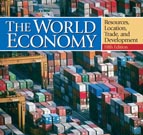Poor face "most serious" impact from financial crisis
 Washington - Developing countries could face the most serious damage from a prolonged global credit crisis and have fewer resources to keep their own banks and businesses from collapsing, World Bank and International Monetary Fund members warned Sunday.
Washington - Developing countries could face the most serious damage from a prolonged global credit crisis and have fewer resources to keep their own banks and businesses from collapsing, World Bank and International Monetary Fund members warned Sunday.
The IMF and World Bank promised to use their "full range of resources" to help countries that cannot manage the spreading financial crisis on their own, in a statement after the two global lenders' annual meeting.
World Bank President Robert Zoellick again urged wealthy countries to maintain aid pledges to the poor despite the turmoil and recession fears in their own backyards.
Some 30 countries face serious budget shortfalls as exports have dropped and money coming in from leery foreign investors has slowed, the World Bank said earlier this week.
The IMF on Thursday boosted its own lending facilities for struggling countries. The World Bank is considering its own programme to help recapitalize banks through its private investment arm, the International Finance Corporation, Zoellick said.
Developing countries already hit by surging food and fuel prices "risk very serious setbacks to their efforts to improve the lives of their populations from any prolonged tightening of credit or sustained global slowdown," Zoellick said.
"The poorest and most vulnerable groups risk the most serious - and in some cases permanent - damage."
US Treasury Secretary Henry Paulson recognized a crisis that began in the US housing market had spread to the developing world, and said it was "imperative" that the IMF and World Bank help ease the impact on the poor.
Members of the Development Committee of the IMF and World Bank urged more contributions to a fund to help offset the food crisis. Pledges of some 1.2 billion dollars have been received to date, including 50 million dollars offered this week by Australia.
The World Bank is launching a new "energy for the poor" fund, as well as two climate funds to deal with other ongoing problems faced by poorer countries.
"The financial crisis adds a crisis to a crisis" for the developing world, said IMF Managing Director Dominique Strauss-Kahn, who noted that the "other crises" will stay around as the financial turmoil eases.
Paulson assured that the United States' own actions to tackle the crisis would not reduce trade flows. He warned other countries against closing their markets.
"Across the globe, policymakers will be faced with difficult choices," Paulson said in a statement. "As with the food price crisis, isolationism and protectionism will not offer a way out." (dpa)